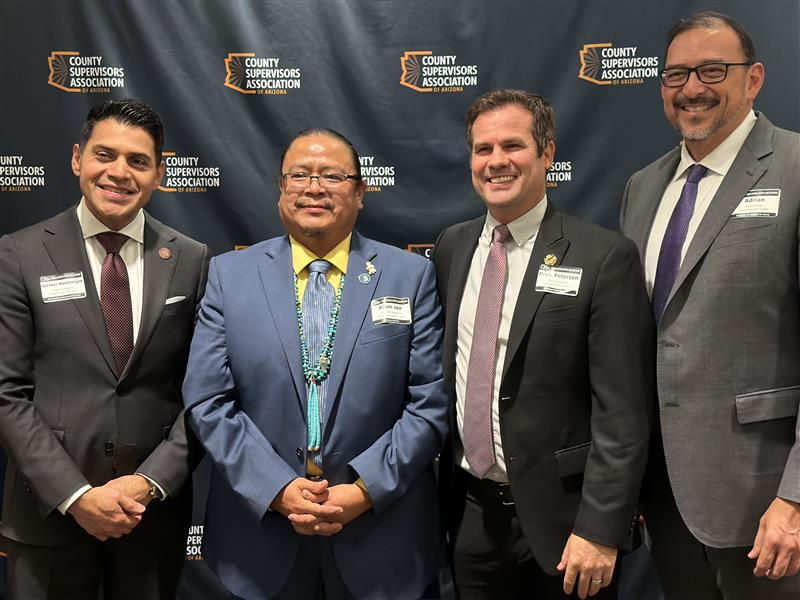CSA Weekly Update (11.14.2025)
- County Supervisors Association of Arizona
- Nov 14, 2025
- 8 min read
Updated: Nov 21, 2025
In the November 14th, 2025, edition of the CSA Weekly Update:
Former Supervisor Grijalva Sworn in as Newest Member of Congress
AI, Microtrenching, and More! County Managers and Administrators Meet in Phoenix
Another Creatures of Statute Episode! CSA’s Public Pension Resolution: The Importance of Data-driven Policy
Funding Discussions Begin: JLBC and JCCR Meet
CSA Priority Spotlight: Ongoing Funding for State Probation Officers
Healthcare Fraud Discussions Continue: AHCCCS Testifies Before the Senate HHS Committee
November NACIRO Meeting: Insights from Washington D.C.
2025 CSA Policy Summit: Outcomes and Official Legislative Agenda
Upcoming Deadlines, Conferences, and Webinars: NACO Ongoing Webinar - Inside Washington: County Impacts from the White House & Congress
Lifelong Learning: Upcoming NACo Webinars
Former Supervisor Grijalva Sworn in as Newest Member of Congress

Representative Adelita Grijalva was sworn in on Wednesday, November 12th, 2025, representing Congressional District 7 and becoming the first Latina elected to represent Arizona in Congress. Congratulations Representative Grijalva!
AI, Microtrenching, and More! County Managers and Administrators Meet in Phoenix
County Managers and Administrators joined us on Friday, November 14 to discuss a variety of projects happening in their counties and general updates affecting counties, and prepare for the legislative session ahead. During our meeting, Maricopa County Chief Information Officer, Richard McHattie, presented on Maricopa County’s adoption and implementation efforts of AI technology. The presentation touched on how the county is leveraging AI to facilitate internal communication, automation, resource and information finding, and constituent communication and support. Additionally, Christopher Wannamaker, Pinal County’s Engineer, presented on the process and development of Microtrenching Standards in the county. Pinal has been leading preparation efforts for fiber installation to meet the demand for broadband access and to get ahead of the disbursement of BEAD funding. Mr. Wannamaker will be presenting again at Arizona Association of County Engineers on January 22, 2026. CSA staff provided a brief update on progress made on the legislative agenda as deadlines rapidly approach. Finally, a federal update was provided, and counties had an opportunity to discuss items of interest.
Another Creatures of Statute Episode! CSA’s Public Pension Resolution: The Importance of Data-driven Policy
CSA recently adopted a policy resolution on public pensions — a statement that reflects a commitment to both fiscal responsibility and supporting Arizona’s public employees. In our latest episode of Creatures of Statute, we take a closer look at what this resolution means for counties and the broader conversation around the sustainability of the systems.
To access our adopted resolution click here, and you can review additional materials on this topic here: countysupervisors.org/pensions. All CSA resolutions are at countysupervisors.org/advocacy.
Funding Discussions Begin: JLBC and JCCR Meet
Joint Committee on Capital Review (JCCR)
The Joint Committee on Capital Review assembled on November 10, 2025, to review state agencies’ capital proposals for the upcoming fiscal years and grant approval cycles. Arizona’s financial state was major player throughout the discussions with agency representatives, raising questions from Chairman Livingston and Representative Gress about project stages, appropriation sources, and consideration of funding limitations. Some project proposals were denied or partly denied if the monies came from General Fund, were multi-stage projects or the state agency had uncertain future plans, such as the Department of Juvenile Corrections’ leasing of state land for the Adobe Mountain Facility. The Committee emphasized focusing on essential projects to mitigate spending. While some capital projects were approved, others were denied or were not evaluated, bringing into question the Committee’s funding priorities and future budget discussions.
Joint Legislative Budget Committee (JLBC)
Following JCCR, legislators convened for the Joint Legislative Budget Committee and approved a majority of items regarding budget and financial matters on the consent agenda. However, the legislators considered ADOA’s A to Z Access Portal progress and expected financial burden on state, and reviewed ABOR’s expenditure plan of tuition and fee revenues. These discussion revolved around the state’s uncertain financial conditions and potential inability to meet obligations.
CSA Priority Spotlight: Ongoing Funding for State Probation Officers
Earlier this week, on November 10th, 2025, the President and President-elect of the County Supervisors Association of Arizona – Yuma County Supervisor Lynne Pancrazi and Apache County Supervisor Alton Joe Shepherd, respectively – sent a letter to state leaders requesting “their assistance in ensuring the state meets its commitments to its probation officers in the FY 2026 - FY 2027 state budget and beyond.” This letter was sent to Governor Hobbs, House Speaker Montenegro, Senate President Petersen, Senate Democratic Caucus Leader Sundareshan, House Democratic Caucus Leader De Los Santos, and the Senate and House Chairs and Ranking Members of the Committees on Appropriations in virtual and physical formats.
Probation officers are state employees overseen by the judiciary – the Administrative Office of the Courts – but, in all counties except Maricopa County, are jointly funded by the state and the counties. State law has delegated to County Boards of Supervisors the responsibility of setting the salaries of probation officers after consultation with their local Superior Court’s Presiding Judge, but the state – for four years – has not appropriated ongoing resources to fund their share of the raises extended to these officers. While the state has consistently met its obligation – appropriating state or federal monies on a one-time basis in each of the four years - probation officers and the counties face significant uncertainty with each new year. The cost to ensure there is sufficient funding for raises already extended is – at present - $10.4 million annually.
The Association has respectfully asked for certainty that the state meets its obligation in an ongoing manner.
Arizona Rural Health Transformation Program: Meeting 2

On November 13, the Office of Governor Katie Hobbs – represented by Health Policy Advisor Meaghan Kramer – and the Arizona Health Care Cost Containment System, represented by Josue Macias, held the second meeting on the state’s Rural Health Transformation Program application, which seeks some of the $50 billion appropriated in the federal government’s HR 1 to fund rural healthcare and is intended to mitigate related cuts to Medicaid in the bill.
Please find a link to the first webinar by clicking HERE, and please find a link to the slides by clicking HERE.
Healthcare Fraud Discussions Continue: AHCCCS Testifies Before the Senate HHS Committee
The Senate Health and Human Services Committee convened to continue discussions about the prevention efforts and response addressing Medicare fraud and abuse of sober living homes that targeted Indigenous communities. The Committee shared their ongoing concerns about the impact providers are experiencing due to the increased scrutiny and oversight from the state agency, including the risk of going out of business and being unable to provide services. AHCCCS representatives testified, answered comprehensive questions, and outlined an improvement plan to address the concerns raised by the committee in previous meetings; which included 1) enhancing provider relationships, 2) improving claiming times, 3) strategically focusing on provider support, and 4) broadening offerings and reach for provider assistance.
November NACIRO Meeting: Insights from Washington D.C.
On Wednesday, November 12th the National Association of County Intergovernmental Officials (NACIRO) met with NACo leadership and transportation policy experts to discuss developments at the federal level impacting county governments. Much of the work NACo leadership is doing currently focuses on advocacy for counties, tracking executive orders, changes to grant terms and conditions, and other funding issues likely to impact counties. As more changes to federal funding models are proposed, NACo leadership emphasized how telling counties stories helps demonstrate to members of congress how counties are working diligently to provide services to constituents in a fiscally responsible manner. Especially as property taxes are being scrutinized more frequently, counties communicating with their congressional delegation and state officials will be increasingly vital to protect this county funding source.
2025 CSA Policy Summit: Outcomes, Official Legislative Agenda, and 2026 Adopted Priorities!
At the Summit, the Supervisors in attendance voted on the Association's legislative, budget, and research priorities for the upcoming legislative session. For additional details on the Association's 2026 priorities, please see the Coalition Resolutions and County-Submitted Proposals sections below!
County-Submitted Proposals
Of the original 17 County-Submitted Proposals presented at the Association's Policy Summit, 11 passed within the supermajority threshold required to adopt a proposal into the Association's official agenda for the 2026 legislative session. Staff have prepared an overview document with all 11 proposals as passed at the Board of Directors meeting on Thursday, October 30th. Please find the outcome report linked here as well as listed below!
“Recapitalization of the DFFM Wildfire Emergency Response Fund”
“Accountability for taxpayers maintaining non-owned properties”
“Solar Energy Consumer Protection.”
“Maintaining Public Trust by Preserving Name Rights.”
Creating a Regulatory Framework for Above-Ground Cold Plunges
“WIFA forgivable funding for cesspool and outdated septic system infrastructure”
“Permanent Funding for the Arizona State Historic Preservation Office”
“Fire code inspection waiver for municipalities over 100,000 residents.”
Increase local responsiveness regarding short-term rental units, including unfair tax treatment.
Permanent statewide solution to election calendar issues
Coalition Resolutions
Upcoming Deadlines, Conferences, and Webinars
NACO Ongoing Webinar - Inside Washington: County Impacts from the White House & Congress
Biweekly on Thursdays | May 15 - December 11, 2025, 3:30-4:30 P.M. ET
Building off NACo’s First 100 Days webinar series, we are starting a biweekly series to provide timely updates and analysis on key developments from the White House and Congress. Each session focuses on policies and actions that directly impact counties — from federal funding and regulatory changes to intergovernmental partnerships. Tune in every other week to stay informed on how these evolving federal dynamics may shape county priorities, responsibilities and operations.
To register, please click here.
Lifelong Learning: Upcoming NACo Webinars + Events
Lifelong Learning: Upcoming NACo Webinars
Driving GenAI in County Government: A Collaborative, Outcomes-Focused Approach
Tuesday, November 18, 2025; 2:00 - 3:00 p.m. ET
Artificial intelligence—especially generative AI—is no longer a “future trend” for county governments. It’s here, and its impact depends on how it’s implemented. Successful projects don’t start and end with the IT department; they require strong collaboration across communications, customer service, and business units to ensure technology delivers real outcomes for residents.
Hear from Wyandotte County, Kan., where a community speaking 31 languages and handling 50,000 calls a year with just three staff members needed a smarter way to serve residents. Learn how the county partnered across departments to design and deploy conversational digital agents that address real service challenges—while safeguarding data, maintaining public trust, and ensuring equitable access.
You’ll walk away with:
Practical strategies for building AI projects around resident-focused outcomes.
Lessons learned from cross-department collaboration between IT, communications, and customer service.
Insights on using AI safely in diverse, high-demand service environments.
This is a candid, real-world look at how counties can responsibly adopt AI to improve service delivery—without losing sight of the people behind the technology.
To register, click here.
Tackling the Child Care Workforce Crisis: A County-Led Solution
Thursday, November 20, 2025; 2 - 3 p.m. ET
Counties across the nation are facing a child care workforce crisis that limits affordability and accessibility for families' child care needs and economic growth. In this session, King County, Wash., and its partners will share how they piloted a wage boost program that supports over 800 child care workers. The Pilot will study staff retention, program stability, worker wellbeing, and what it means to have meaningful public investment in workers serving families across the county. Join us to explore practical lessons, cross-sector partnerships, and strategies your county can adapt to strengthen its own child care workforce.
Featuring:
Moderator: Julia Ford, Senior Director of Partner Success, Aidkit
Panelists:
Kalayaan Domingo, Program Manager, King County,
Cassie Manning, Partner Success Manager, AidKit
Justin Doromal, Senior Research Associate, Urban Institute
Miriam Acosta, Imagine Institute
Ishmael Nuñez, Partner, Uncommon Bridges
To register, click here.














Comments